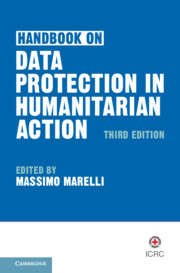Handbook on Data Protection in Humanitarian Action
This handbook is a foundational text which offers a comprehensive, accessible analysis of personal data protection law, and its significance to humanitarian organizations. Bringing together years of research on personal data protection principles, it outlines how humanitarian organizations can use these principles to uphold the rights and dignity of the most vulnerable. Reflecting the rapid evolution of new technologies, the handbook provides an in-depth analysis of the impacts of using specific technologies in humanitarian contexts. It raises awareness of the importance of data protection and suggests practical steps that humanitarian organizations can implement to process the personal data that they hold in a responsible manner that complies with personal data protection principles and requirements. With tailored advice and extensive, up-to-date research, this is a vital resource for humanitarian practitioners and lawyers, data protection authorities and researchers working on humanitarian affairs and personal data protection. This title is also available as Open Access on Cambridge Core.
- Available as Open Access on Cambridge Core
- Offers a comprehensive analysis of data protection principles and requirements as they apply in humanitarian action
- Analyzes the impact of using specific types of technologies in humanitarian contexts
- Provides guidance and suggests practical steps that humanitarian organizations can take to process the personal data that they hold in a responsible manner
Product details
November 2024Paperback
9781009414654
380 pages
229 × 152 × 20 mm
0.56kg
40 b/w illus.
Available
Table of Contents
- 1. Introduction
- Part I. Data Protection Principles in Humanitarian Action:
- 2. Basic principles of data protection Massimo Marelli
- 3. Legal bases for personal data processing Massimo Marelli
- 4. International data sharing Massimo Marelli
- 5. Data Protection Impact Assessments (DPIAs) Massimo Marelli
- 6. Designing for data protection Carmela Troncoso and Wouter Lueks
- 7. Drones/UAVs and remote sensing Massimo Marelli
- 8. Biometrics Massimo Marelli
- 9. Cash and voucher assistance Massimo Marelli
- 10. Cloud services Paolo Balboni
- 11. Cloud and government access Andrea Raab-Gray
- 12. Mobile messaging apps Lina Jasmontaite
- 13. Digital identity Vincent Graf Narbel
- 14. Social media Julia Zomignani Barboza and Lina Jasmontaite
- 15. Blockchain Vincent Graf Narbel
- 16. Connectivity as aid Aaron Martin and John Warnes
- 17. Artificial intelligence Alessandro Mantelero
- Appendix I. Template for a DPIA report
- Appendix II. Workshop participants
- Bibliography.






